Unlock the Benefits of Using Organic Fertilizers for Cannabis Cultivation
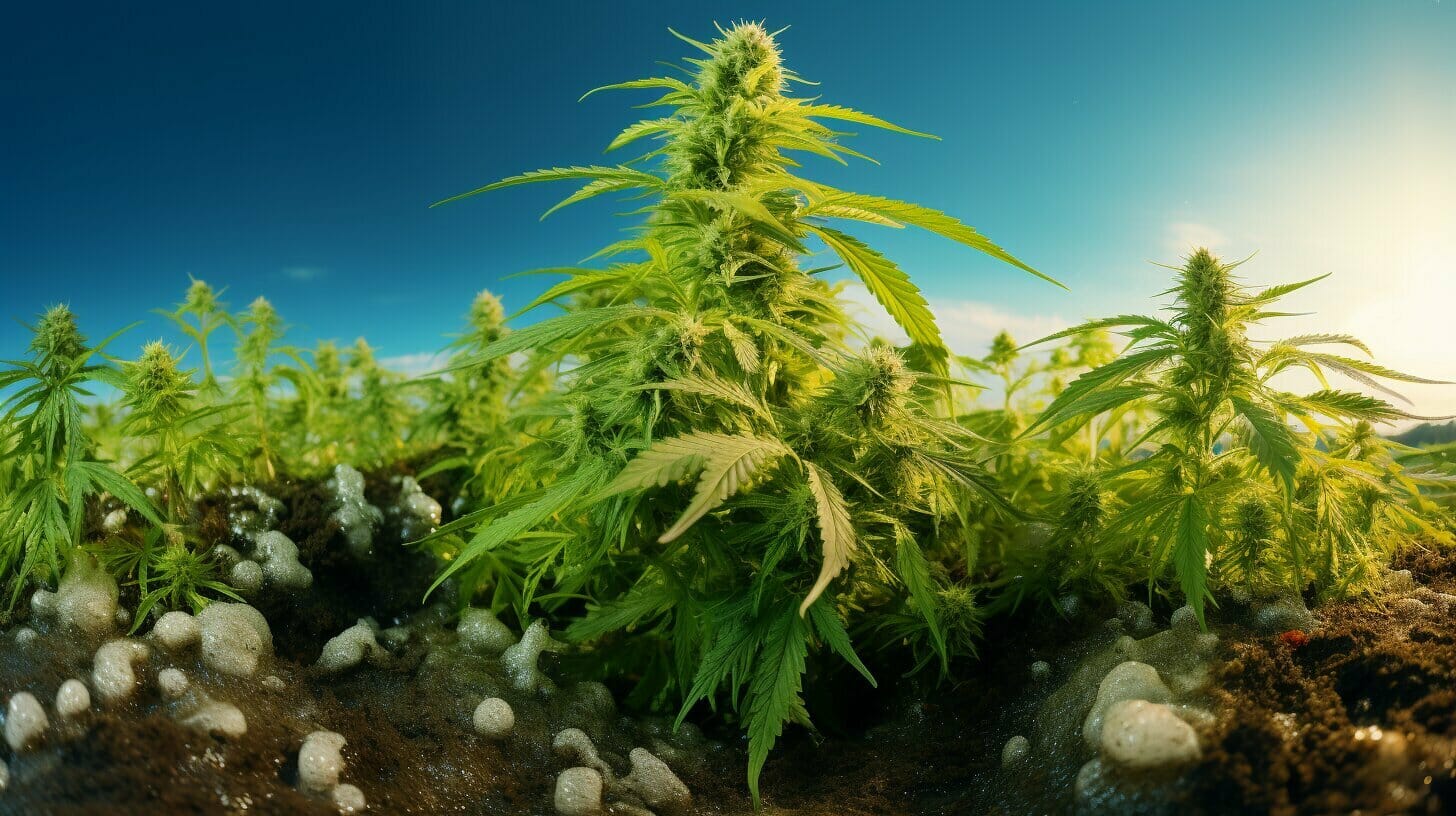
As the cannabis industry continues to expand, the demand for organic cannabis is on the rise. Sustainable farming practices have become a key focus for cultivators who prioritize the health and quality of their plants and the environment. One of the most critical aspects of cannabis cultivation is fertilization, and the use of organic fertilizers has proven to be highly effective in promoting optimal growth, yield, and potency.
When it comes to organic fertilizers for cannabis, there are numerous options available, each offering unique benefits to the plant and the soil. Organic fertilizers differ from synthetic fertilizers in that they incorporate natural and sustainable ingredients that promote healthy soil, beneficial microbial activity, and nutrient absorption. By avoiding the use of harmful chemicals and toxins, organic fertilizers provide a safer and healthier cultivation method for both growers and consumers.
Key Takeaways:
- Organic fertilizers promote sustainable and healthy cannabis cultivation practices.
- Organic fertilizers are more effective in enhancing plant growth, yield, and potency than synthetic fertilizers.
- Organic fertilizers contribute to long-term soil fertility and create a balanced ecosystem for plant growth.
Why Use Organic Fertilizers for Cannabis Cultivation?
If you’re looking to grow premium cannabis with superior quality, potency, and sustainability, then organic fertilizers are your go-to solution. Unlike synthetic fertilizers, organic fertilizers are made from natural materials and offer unique benefits that enhance the growth and yield of cannabis plants.
One of the main advantages of using organic fertilizers for cannabis cultivation is that they promote the development of healthy and robust plants. Organic fertilizers contain a range of essential nutrients, including nitrogen, phosphorus, and potassium, as well as secondary and micronutrients that are vital for plant growth and health.
Another significant benefit of organic fertilizers is that they improve the quality and potency of cannabis. Organic fertilizers promote slower and more consistent nutrient release, which ensures that the plants absorb nutrients over a more extended period. This extended feeding schedule results in cannabis buds that are more flavorful, aromatic, and potent. Additionally, organic fertilizers improve soil structure and water retention, which contributes to stronger root development and healthier plants.
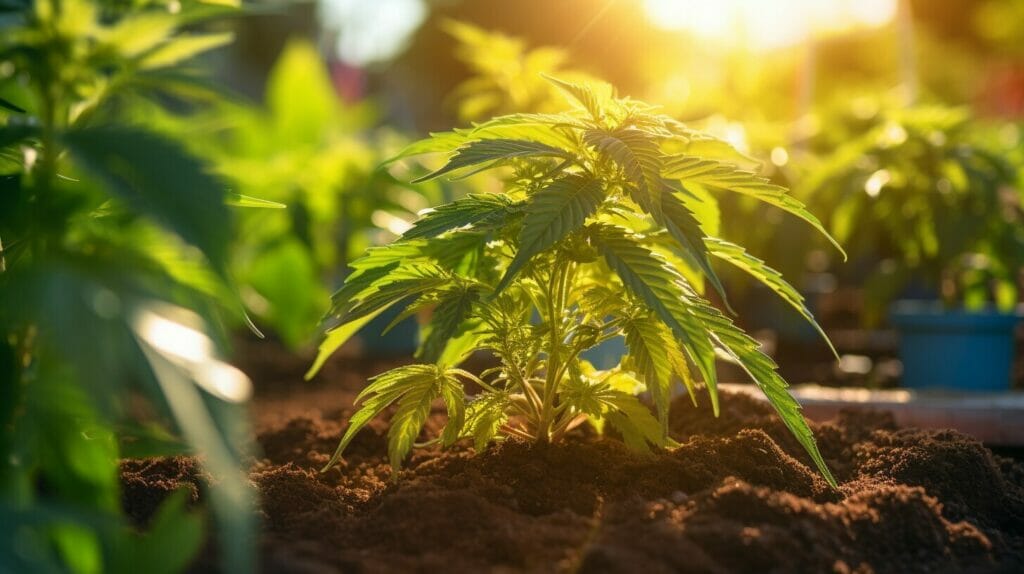
Using organic fertilizers not only benefits your plants, but also benefits the environment and consumer health. Organic fertilizers are free of harmful chemicals and toxins commonly found in synthetic fertilizers, which can accumulate in the soil and waterways and pose health risks to humans and animals.
In short, using organic fertilizers in cannabis cultivation offers numerous benefits, including enhanced plant growth, increased yield, improved quality and potency, and a safer and more sustainable growing environment.
Organic Fertilizers vs Synthetic Fertilizers in Cannabis Cultivation
When it comes to cannabis cultivation, one of the most significant decisions a grower can make is choosing between organic fertilizers and synthetic fertilizers. While both options ultimately provide nutrients to the plants, they differ in their composition, environmental impact, and long-term effects on soil health.
Organic fertilizers are derived from natural sources such as plant matter, animal waste, and minerals. They release nutrients slowly and require microbial activity in the soil to break down and make nutrients available to the plants. In contrast, synthetic fertilizers are manufactured chemically and designed to deliver specific nutrients quickly and in high concentrations.
| Organic Fertilizers | Synthetic Fertilizers |
|---|---|
| – Derived from natural sources | – Manufactured chemically |
| – Release nutrients slowly | – Deliver nutrients quickly and in high concentrations |
| – Require microbial activity in the soil to break down | – Do not require microbial activity |
| – Improve soil health and fertility over time | – May lead to soil degradation and nutrient depletion |
| – Sustainable and environmentally friendly | – May contain harmful chemicals and contribute to pollution |

While synthetic fertilizers may seem like an attractive option due to their quick and targeted nutrient delivery, they come with several potential risks and drawbacks. The high concentration of nutrients can lead to nutrient imbalances and toxic buildup in the soil, which can harm beneficial microbes and affect the plant’s growth and yield over time. Furthermore, synthetic fertilizers often contain harmful chemicals such as heavy metals and petrochemicals that can accumulate in the soil and potentially harm the environment and consumer health.
On the other hand, organic fertilizers offer several advantages that make them a popular choice among cannabis growers. Organic fertilizers promote soil health and fertility over time because they improve soil structure and microbial activity, leading to increased nutrient availability and plant growth. They are also environmentally friendly and sustainable because they do not contain harmful chemicals or contribute to pollution, making them a more ethical and responsible choice for modern farming practices.
The Importance of Organic Fertilizers in Cannabis Cultivation
Organic fertilizers play a crucial role in cannabis cultivation, not only for the plant’s growth and yield but also for the overall health and sustainability of the ecosystem. The use of organic fertilizers promotes beneficial microbial activity in the soil, enhances nutrient availability, and creates a balanced ecosystem for plant growth.
Chemical fertilizers, on the other hand, can have potentially harmful effects on the environment and consumer health. Synthetic fertilizers contain high concentrations of nutrients and minerals, but they also leave chemical residue in soil and water, leading to soil degradation and negative environmental impact. Organic fertilizers, on the other hand, are safe and sustainable, contributing to long-term soil fertility and plant health.
By using organic fertilizers, cannabis growers can avoid the potential long-term effects of chemical fertilizers and create a healthier and more sustainable environment. It is vital for growers to prioritize using organic fertilizers to ensure that the cannabis they produce is beneficial to both the consumer and the environment.

Enhancing Cannabis Cultivation with Organic Soil Amendments
Using organic soil amendments in cannabis cultivation provides numerous benefits that go beyond just fertilization. Compost, for example, is a popular organic soil amendment that enhances soil structure, water retention, and nutrient absorption. Compost contains a diverse range of beneficial microorganisms and nutrients that promote soil health and fertility.
Worm castings, the rich organic matter produced by earthworms, are another highly effective soil amendment that can improve soil quality, stimulate plant growth, and increase yield. Worm castings are naturally high in beneficial microbial activity and essential nutrients like nitrogen, phosphorus, and potassium.
| Benefits of Using Organic Soil Amendments in Cannabis Cultivation |
|---|
| – Improves soil structure and water retention |
| – Increase nutrient availability and absorption |
| – Promotes beneficial microbial activity in soil |
| – Contributes to long-term soil fertility and plant health |
Incorporating organic matter into the soil is a key aspect of sustainable farming practices. Not only does it help to reduce the use of synthetic fertilizers, but it also promotes biodiversity and creates a balanced ecosystem for plant growth.

Overall, organic soil amendments are an essential component of organic cannabis cultivation. Incorporating compost, worm castings, and other organic matter can improve soil quality, increase yield, and enhance the overall health and sustainability of cannabis cultivation.
Sustainable Fertilization in Cannabis Growing
Cannabis cultivation has come a long way, with growers focusing on sustainable methods that minimize environmental impact and promote long-term soil health. As the demand for organic and natural cannabis grows, sustainable fertilization practices have become more critical in the industry.
Organic fertilizers are an essential component of sustainable fertilization in cannabis growing. Unlike their synthetic counterparts, organic fertilizers are derived from natural plant and animal sources, making them more environmentally friendly and safer for consumer use. They also provide several other benefits that promote long-term soil health and plant growth.
By using organic fertilizers, growers can improve soil microbiology, enhance nutrient uptake, and increase soil fertility. These benefits contribute to higher yields, improved quality, and more potent cannabis plants.
Moreover, organic fertilizers help mitigate the risk of nutrient leaching, which can contaminate groundwater and harm local ecosystems. They are also less likely to harm beneficial soil microbes, which support plant growth and protect against pests and diseases.
Organic fertilizers align with the principles of sustainable fertilization in cannabis growing by promoting soil health, reducing waste, and conserving resources for future cultivation. They contribute to a more balanced, biodiverse ecosystem that supports plant growth and provides numerous benefits for the environment and consumer health.
Common Types of Organic Fertilizers for Cannabis
Choosing the right type of organic fertilizer for your cannabis crop is crucial for ensuring optimal growth and yield. Each type of organic fertilizer offers different benefits and nutrients to the soil, which in turn reflects on the quality of your cannabis harvest. Here are some of the most common types of organic fertilizers used in cannabis cultivation:
| Fertilizer Type | Nutrient Content | Application Method |
|---|---|---|
| Compost | Contains nitrogen, phosphorus, potassium, and other micronutrients | Added to soil before planting or top-dressed during the growing season |
| Manure | High in nitrogen, phosphorus, and potassium | Added to soil before planting or top-dressed during the growing season |
| Bone Meal | High in phosphorus and calcium, with moderate levels of nitrogen | Mixed into soil before planting or top-dressed during the growing season |
| Seaweed Extract | Rich in micronutrients such as iron, zinc, and manganese, with some nitrogen and potassium | Applied as a foliar spray or mixed into soil and watered in |
| Fish Emulsion | High in nitrogen and phosphorus, with some potassium and micronutrients | Applied as a foliar spray or mixed into soil and watered in |
Organic fertilizers are generally slower-acting than synthetic fertilizers, but they provide more long-term benefits to the soil and plants. It is important to choose a fertilizer that matches your soil’s pH level and nutrient needs, and to follow the recommended application rates to avoid nutrient imbalances or toxicity.

Best Practices for Using Organic Fertilizers in Cannabis Cultivation
Using organic fertilizers in cannabis cultivation can lead to a healthier, higher-quality crop. However, proper usage is key to maximizing the benefits of organic fertilizers. Here are some best practices for using organic fertilizers in cannabis cultivation:
- Test your soil: Before applying any fertilizer, it’s important to test your soil to determine its nutrient content and pH level. This will help you determine what type and amount of fertilizer to use for optimal growth.
- Follow dosage instructions: Organic fertilizers may come in different forms and strengths, so be sure to carefully read the label and follow the dosage instructions. Applying too much fertilizer can lead to nutrient excess and damage the plant.
- Apply at the right time: The timing of fertilizer application is crucial for cannabis growth. Apply fertilizers during the vegetative stage and early flowering stage, avoiding fertilizing during the later stages of flowering.
- Use the right application method: Organic fertilizers can be applied in a variety of ways, such as top-dressing, foliar spraying, or watering into the soil. Choose the method that best suits your needs and the needs of your plants.
- Monitor nutrient levels: Keep a close eye on your plants and monitor for signs of nutrient deficiency or excess. Adjust your fertilizer usage as needed to maintain a proper nutrient balance.
- Compost and recycle: Organic fertilizers can come from a variety of sources, including food waste and yard trimmings. Composting and recycling these materials can help you create your own nutrient-rich fertilizer while reducing waste.
Following these best practices can help you achieve a healthy and sustainable cannabis crop with the use of organic fertilizers.
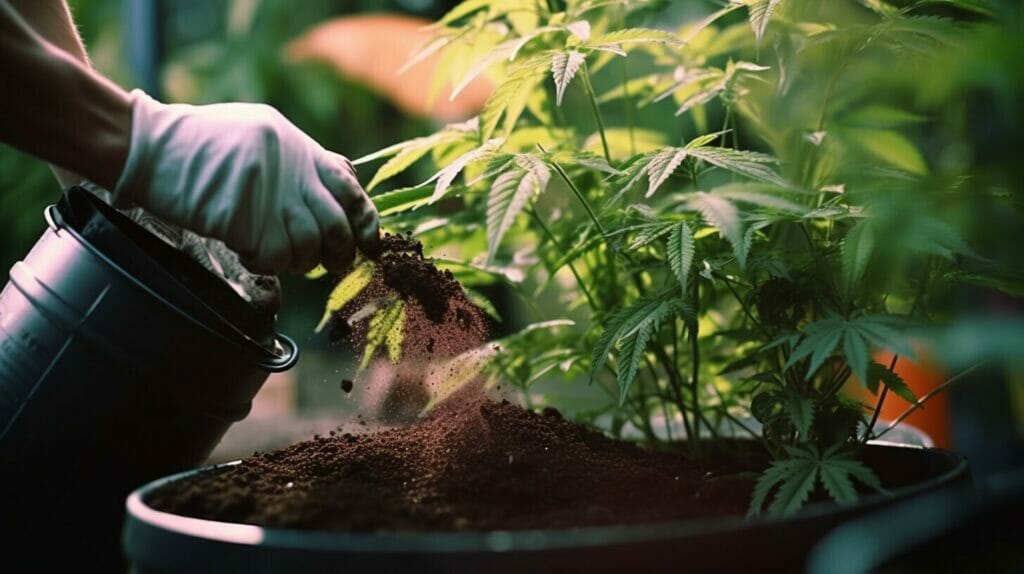
Maximizing the Benefits of Organic Fertilizers in Cannabis Cultivation
Using organic fertilizers in cannabis cultivation is a great first step towards a healthier and more sustainable crop. However, there are additional strategies that can be implemented to maximize the benefits of organic fertilizers and improve the overall health and yield of your cannabis plants.
One useful technique is crop rotation, which involves alternating the types of plants grown in a particular area. This can help prevent soil depletion and nutrient imbalances, as different crops have different nutrient requirements. Additionally, intercropping involves planting multiple crops in the same area, which can promote beneficial interactions between plants and improve soil health.
Cover cropping is another effective technique for maximizing the benefits of organic fertilizers. This involves planting cover crops such as clover or legumes in between planting cycles. These crops can help fix nitrogen in the soil, improve soil structure, and suppress weed growth.
Proper irrigation is also a key factor in maximizing the benefits of organic fertilizers. Over-watering or under-watering can lead to nutrient leaching or nutrient deficiencies in the soil, respectively. Temperature control and light exposure are also important considerations for optimizing the plant’s response to organic fertilizers.
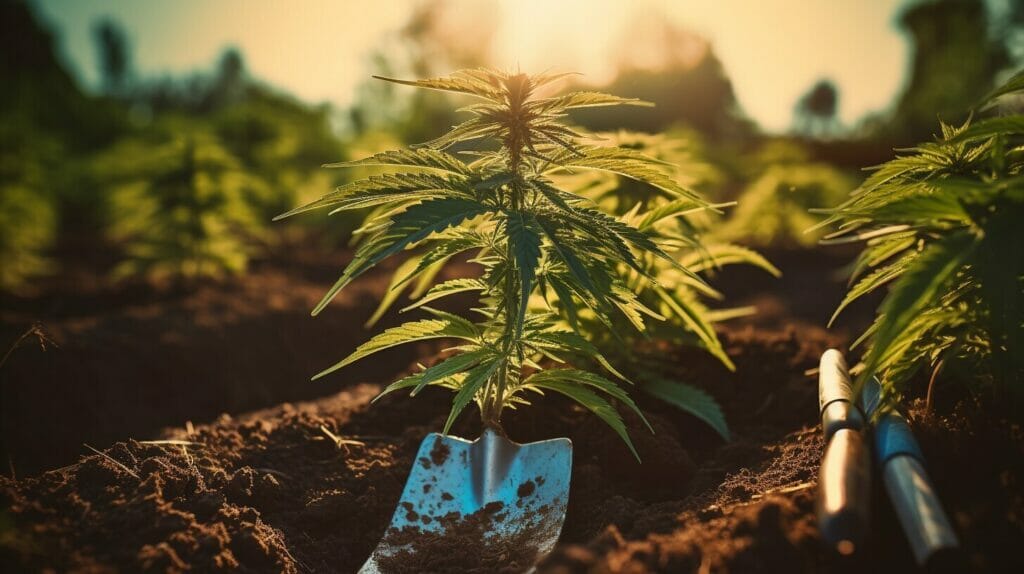
By implementing these techniques and strategies, you can maximize the benefits of organic fertilizers in your cannabis cultivation. This will not only lead to a healthier and more sustainable crop, but also improve the flavor, potency, and overall quality of your final product.
Conclusion
Organic fertilizers are a game-changer in the cannabis industry, providing numerous benefits for both growers and consumers. By using organic fertilizers, cultivators can achieve higher yields, better quality, and more sustainable practices.
It’s crucial to prioritize organic and sustainable cultivation methods to ensure the long-term health of both plants and the environment. With the right approach, growers can maximize the benefits of organic fertilization and unlock the full potential of their cannabis crop.
Remember to follow best practices for using organic fertilizers, including proper application, soil testing, and nutrient balance. Consider incorporating organic soil amendments and implementing sustainable cultivation practices like crop rotation and intercropping.
By embracing organic and sustainable farming practices, we can create a brighter future for the cannabis industry and the planet as a whole. Let’s work together to cultivate a healthier, higher-quality cannabis crop.
FAQ
Q: What are the benefits of using organic fertilizers in cannabis cultivation?
A: Organic fertilizers enhance plant growth, increase yield, and improve the quality and potency of the final product. They also promote sustainable farming practices and avoid harmful chemicals and toxins.
Q: How do organic fertilizers compare to synthetic fertilizers in cannabis cultivation?
A: Organic fertilizers have advantages in terms of sustainability, soil health, and long-term benefits, while synthetic fertilizers can have potential risks such as chemical residue, soil degradation, and negative environmental impact.
Q: Why is using organic fertilizers important for cannabis cultivation?
A: Organic fertilizers promote beneficial microbial activity in the soil, enhance nutrient availability, and create a balanced ecosystem for plant growth. They also help avoid the long-term effects of chemical fertilizers on the environment and consumer health.
Q: How do organic soil amendments enhance cannabis cultivation?
A: Organic soil amendments like compost and worm castings improve soil structure, water retention, and nutrient absorption. They contribute to long-term soil fertility and the overall health of cannabis plants.
Q: What is sustainable fertilization in cannabis growing?
A: Sustainable fertilization in cannabis growing involves reducing environmental impact, conserving resources, and adopting regenerative farming practices. Organic fertilizers align with this approach and support sustainable cultivation methods.
Q: What are some common types of organic fertilizers for cannabis?
A: Common types of organic fertilizers for cannabis include compost, manure, bone meal, seaweed extract, and fish emulsion. Each has specific benefits and usage instructions.
Q: What are the best practices for using organic fertilizers in cannabis cultivation?
A: Follow guidelines for timing, dosage, and application methods. Conduct soil testing, maintain proper nutrient balance, and avoid deficiencies or excesses. Composting and recycling organic waste can also contribute to sustainable fertilization.
Q: How can I maximize the benefits of organic fertilizers in cannabis cultivation?
A: Incorporate crop rotation, intercropping, and cover cropping for nutrient cycling and pest management. Ensure proper irrigation, temperature control, and light exposure to optimize the plant’s response to organic fertilizers.
Suggested Articles
;)
;)
;)



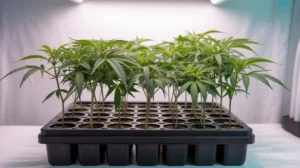
 22 Jan 2026
22 Jan 2026  6 min read
6 min read
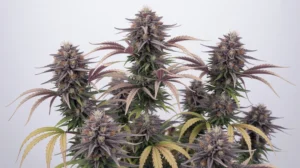
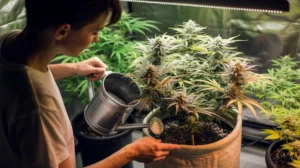
 September 24, 2023
September 24, 2023 


RESPONSES (0)
No responses yet. Be the first to respond!